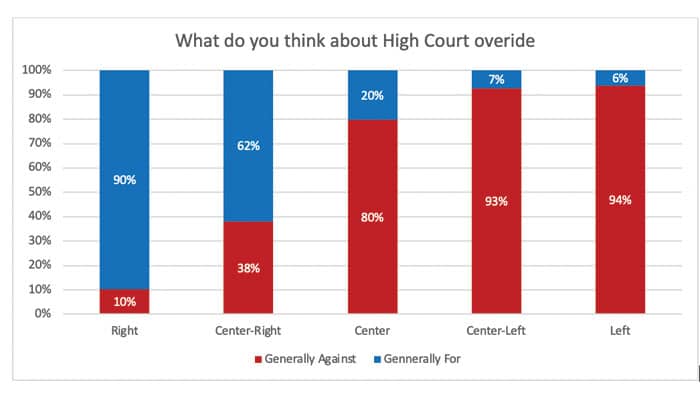 kolderal/Getty Images
kolderal/Getty Images Sometimes, to understand a forest, you must look at one tree. A new government is coming to Israel, energetic, revolutionary, ambitious. There is a blizzard of rumored initiatives, there is a storm of trial balloons, there is a pour of proposals and demands — some of which will materialize, and many that will not. Some of them are realistic, and many will hit a brick wall. Facing such a tempest is confusing, and intimidating. Thus, it’s sometimes better to pick one proposed change, and examine it up close. Let’s do it, using the demand to pass a High Court override law. Such a law would allow the Knesset to repass a law when it is struck down by the court.
The debate about the override law cannot have a fact-based conclusion. Both sides have facts; both sides have ideologues. The facts are chosen selectively to support a position. One camp says: In Canada there is such law. The other camp says: Canada has a constitution! One camp sees Canada as proof that a country can have an override law and remain a functioning democracy. The other camp believes the Canada case is irrelevant.
I had a long conversation this week about our difficulty, as humans, to change our minds with Professor Azar Gat, the author of a fantastic new book: “Ideological Fixation.” He writes in the book, “What I mean by ideological fixation … refers to the ways in which devotion to value preferences may distort understanding of reality, the assessment of past events and future potentialities.” He also writes that “cognitive biases in interpreting the world may serve the causes people pursue, as single-minded and sometimes narrow-minded convictions are often conducive to galvanizing support and pushing through intellectual and social agendas in the public sphere.”
Humans have evolutionary, philosophical, psychological and social reasons for sticking to their positions. The debate about the override law sometimes sounds like a discussion of lawyers but long ago ceased to be the turf of legal professionals. It is a conflict between social groups, an expression of identity. The law professors have no chance of convincing anyone, certainly not when there are law professors on both sides.
What does the public think? Most Israelis do not delve into the details of the arguments for and against the law. Most of them formulate a position based on the signal they get from within their social group. Right-wing voters receive a strong signal to support the change — and therefore they do. Center-left voters receive a strong signal that they must oppose the change — and therefore they do. Both tend to believe that “the other side” is being irrational. It’s not impossible to argue that both, in fact, are being irrational.
The argument for change rests on a bogus case, as if legal experts supported by the court stand in the way of politicians as they strive to implement the policies the public wants. True, some policies were disrupted by the court. True, in some cases the court seemed to have exceeded its mandate. But the system isn’t broken, and the courts aren’t the obstacle standing between Israel and an efficient government. The court is the scapegoat of government. When governments fail, they have someone to blame. Hence, the zeal of radicals who truly believe that an override law is going to change stubborn realities.
The argument against change also rests on a bogus case, as if an override law means the end of Israel’s democracy. It does not. In fact, the law will barely change Israel’s legal construct, as the Knesset, even today, can override any court decision by changing the Basic Law on which the court relies to strike a law. In Israel’s system, Basic Laws are just like any law: A simple majority can alter their wording as it wishes. In fact, Basic Laws are constantly altered to allow for new political arrangements (Example: the recently created Alternate PM position was created by changing a Basic Law). And so, what the new government intends to do is merely make it somewhat simpler to override a court decision. Whether that’s advisable is a good question but claiming that such move is going to put Israel at great risk is an overstatement.
Like many of the currently proposed changes, the override law challenges Israelis — especially those who supported opposition parties — with the most difficult task: to reserve judgment.
Like many of the currently proposed changes, the override law challenges Israelis — especially those who support opposition parties — with the most difficult task: to reserve judgment. Some initiatives might ultimately work to Israel’s benefit, some might not come to fruition, some are going to pass and then be reversed, mugged by reality. And yes, some plans could bring about a change that opposition voters aren’t going to agree with. Is that not the point of having elections? ■
Something I wrote in Hebrew
Here’s something I wrote, addressing disheartened Israeli opposition voters:
What bothers you, that the right won? That the ultra-Orthodox will receive more funding? That substantive legislation is going to change? That the power of the court will be eroded? Don’t say “democracy.” This is a hollow argument. An argument that smacks of rejection of democracy. In fact, democracy has just proven its potency, and brought a new coalition to power. Don’t say “real democracy” because that also smacks of rejection of democracy. It smells like a demand that the rules of democracy be formulated so that the losing side will be the actual winner. Be honest about the things that truly bother you, try to understand what is really causing you despair. When you know what this thing is, you may also have the strength to fight back
A week’s numbers
The numbers behind the column on the left-hand side of the page:

A reader’s response:
Debbi Rosenman writes: “You seem to bend over backwards to defend the worst government in Israel’s history.” My response: you mean the incoming government? Sorry, but I’m not sure how one can tell that a government is the “worst ever” before it even started its term.
Shmuel Rosner is senior political editor. For more analysis of Israeli and international politics, visit Rosner’s Domain at jewishjournal.com/rosnersdomain.























 More news and opinions than at a Shabbat dinner, right in your inbox.
More news and opinions than at a Shabbat dinner, right in your inbox.